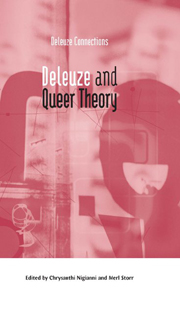Book contents
- Frontmatter
- Contents
- Introduction
- 1 On the Very Possibility of Queer Theory Claire Colebrook
- 2 Thirty-six Thousand Forms of Love: The Queering of Deleuze and Guattari
- 3 The Sexed Subject in-between Deleuze and Butler Anna Hickey-Moody and Mary Lou Rasmussen
- 4 Every ‘One’ – a Crowd, Making Room for the Excluded Middle
- 5 The Adventures of a Sex
- 6 Queer Hybridity
- 7 Prosthetic Performativity: Deleuzian Connections and Queer Corporealities
- 8 Unnatural Alliances
- 9 Schreber and the Penetrated Male
- 10 Butterfly Kiss: The Contagious Kiss of Becoming-Lesbian Chrysanthi Nigianni
- Notes on Contributors
- Index
3 - The Sexed Subject in-between Deleuze and Butler Anna Hickey-Moody and Mary Lou Rasmussen
Published online by Cambridge University Press: 12 September 2012
- Frontmatter
- Contents
- Introduction
- 1 On the Very Possibility of Queer Theory Claire Colebrook
- 2 Thirty-six Thousand Forms of Love: The Queering of Deleuze and Guattari
- 3 The Sexed Subject in-between Deleuze and Butler Anna Hickey-Moody and Mary Lou Rasmussen
- 4 Every ‘One’ – a Crowd, Making Room for the Excluded Middle
- 5 The Adventures of a Sex
- 6 Queer Hybridity
- 7 Prosthetic Performativity: Deleuzian Connections and Queer Corporealities
- 8 Unnatural Alliances
- 9 Schreber and the Penetrated Male
- 10 Butterfly Kiss: The Contagious Kiss of Becoming-Lesbian Chrysanthi Nigianni
- Notes on Contributors
- Index
Summary
Schizoanalysis is the variable analysis of n sexes in a subject, beyond anthropomorphic representation that society imposes on this subject, and with which it represents its own sexuality. The schizoanalytic slogan of the desiring-revolution will be first of all: to each its own sexes.
(Deleuze and Guattari 1983: 296)[T]he notion of the subject carries with it a doubleness that is crucial to emphasise: the subject is one who is presumed to be the presupposition of agency […] but the subject is also subjected to a set of rules or laws that precede the subject […]
(Judith Butler in Meijer and Prins 1998: 285)The ‘set of rules’ to which Butler refers in the latter quote above are the same structures that make up the ‘senselessly privileged’ psychoanalytic subject which Deleuze and Guattari urge their readers to move beyond (Deleuze and Guattari 1983: 298). Deleuze and Guattari critique the ways in which capitalism axiomatises the psychoanalytic subject. Psychoanalysis sutures myth to capitalism and subjectivity, heterosexuality to family and sociability. Psychoanalysis co-constructs homo – sexuality and madness, neither of which offer any escape from the psychoanalytic theatrical stage of capitalism. Rather, homosexuality and madness are co-constitutive of the neurotic, psychoanalytic pole of capitalism. As such, homosexuality and madness have their own traps: madness embodies the schizophrenic social movement in a state too extreme to be useful; homosexuality can operate within a circuit of production-consumption that is excessively closed.
- Type
- Chapter
- Information
- Deleuze and Queer Theory , pp. 37 - 53Publisher: Edinburgh University PressPrint publication year: 2009

